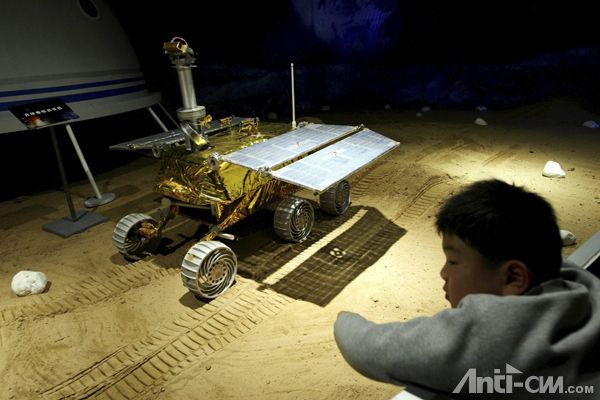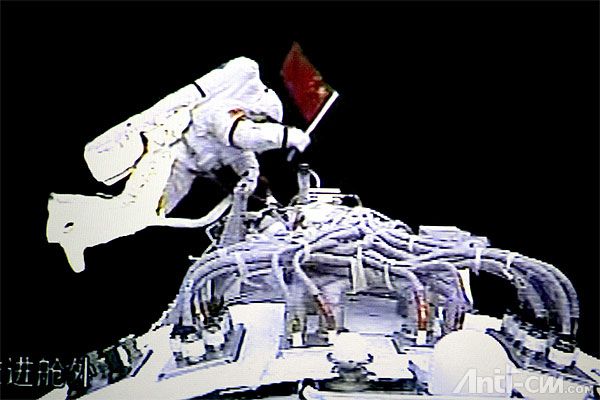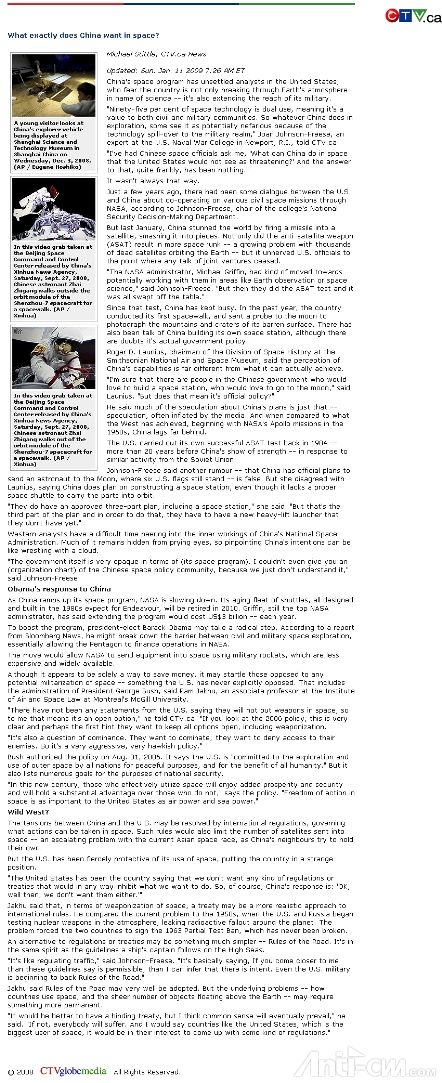本帖最后由 荡漾 于 2009-1-15 01:41 编辑
【原文标题】What exactly does China want in space?
【登载媒体】CTV.ca
【来源地址】http://www.ctv.ca/servlet/ArticleNews/print/CTVNews/20090110/china_space_090111/20090111/?hub=TopStories&subhub=PrintStory
【译者】荡漾
【声明】本翻译供Anti-CNN使用,转载请注明译者及出处,谢谢!
【译文】

中国的太空计划已引起美国分析家们的不安,担心中国不仅以科学的名义冲破大气层,还意欲拓展其 军事空间。
位于罗德岛纽波特的美国海军战争学院的专家Joan Johanson-Freese接受加拿大电视台采访时表示“中国95%的空间技术具备双重用途,兼具民用与军用价值。因此无论中国的太空探测做什么,总会因涉及到军事领域的技术而被视为潜在的邪恶力量”。
“中国的航天官员曾问我‘中国在太空可以做什么而不被美国看作是威胁’?坦率地说,我认为没有”。
但历史并非一直如此。
担任学院国家安全决策部要职的Johnson-Freese指出不过就在几年前中美之间有过对话,计划通过美国航天局的各种民用太空任务进行合作。
但去年1月中国发射导弹成功粉碎一颗卫星令世界震惊。不仅反卫星武器带来了更多的太空垃圾,这是数以千计绕地球运行的卫星产生的日益严重的问题;美国官员也因此沮丧地决定停止任何关于合作的谈判。
Johnson-Freese称“美国航天局局长Michael Griffin曾努力推进双方在地球观测或太空科技等领域的潜在合作”“但由于中国进行反卫星试验,相关商讨因此停止”。
自实验之时起中国加快了其太空脚步。去年中国实现了首次太空行走,并发射了月球探测器拍摄到月球的山脉与贫瘠表面的陨石坑。尽管人们对目前的中国官方政策仍不确定,但有传言说中国正在建立自己的空间站。
美国航空航天博物馆太空历史司主席Roger D. Launius指出人们所感觉到的中国的能力与实际可达到的很不一致“我相信中国政府中有人想要建立空间站,想要登上月球”“但是否这就意味着出台官方政策呢”?
Launius指出有关中国太空计划的说法只不过是猜测,媒体夸大了而已。相比于上世纪60年代美国航天局开启阿波罗计划以来西方所取得的成就,中国仍远远落后。
为应对前苏联美国成功进行反卫星实验还要追溯回到1984年,比中国展示太空实力要早二十多年。
Johnson-Freese提起另一个传闻:中国已制定官方计划送宇航员上月球。这显然是假的,别忘了月球上还插着六面美国国旗。不过与Launius的看法不同,她认为中国的确计划建造空间站,尽管中国缺乏合适的航天飞机将零部件送进轨道。
“中国确实批准了一项三步走的发展计划,其中就包括建立空间站”“不过那是第三步。为了实现这一目标,中国必须拥有新的重型运载火箭,这对中国是前所未有的挑战”。
西方的分析家们很难窥探到中国国家航天局的内部运作,其中很大部分笼罩着神秘的面纱,对于那些想弄明白的人来说无异于雾里看花。
Johnson-Freese指出“(在太空计划)方面中国政府本身就不透明。我甚至都说不出中国太空政策人员的(组织结构图),因为我们根本不了解”。
奥巴马对中国的回应
随着中国加快了太空计划,美国国家航天局则正处放缓状态。所有设计、建造于八十年代的航天飞机已趋向老化,预计于2010年退役。美国国家航天局局长Griffin曾表示延长计划每年需要耗资三十亿美元。
为了促进太空计划新当选的总统奥巴马可能会采取激进的措施。根据彭博社的新闻报道奥巴马也许会打破太空探测民用与军用之间的壁垒,基本上会允许五角大楼参与国家航天局的财政运作。
此举将允许国家航天局借助价格更低、用途更广的军用火箭将设备运送进太空。
尽管这看似不过节约资金的一种方法,却可能令那些反对任何潜在太空军事化的人们不安。美国从未明确表示反对太空军事化,蒙特利尔McGill大学航空航天法副教授Ram Jakhu指出布什政府正是如此。
接受加拿大电视台采访时Jakhu指出“没有任何声明表示美国不会将武器送进太空,在我看来是一种开放的选择”“回头看看2006年的政策就很清楚,也许一开始所有的方案都保持开放度,包括武器化在内”。
“这也是一个有关统治的问题,美国想要主宰太空,拒绝敌人的进入。因此这是极具攻击性、非常强硬的政策”。
布什于2006年8月31日签署批准了这一政策,称美国“致力于全世界以和平为目的探索和利用外部太空,并造福全人类”。但也罗列了众多基于美国国家安全的目标。
“新世纪中能有效利用太空的国家将收获更多的繁荣与安全,相对于未能利用太空的国家将牢牢握有先机”“在太空中能自由行动对美国来说和空、海力量一样重要”。
霸道的西方?
中美之间的紧张局势或许可以通过规范太空中所能采取什么行动的国际法规来解决。法规也可以限制发送进太空的卫星数量,在目前的亚洲太空竞赛中卫星是一个不断升级的问题,因为中国的邻居们都设法拥有自己的卫星。
但美国一直极力对其太空利用行动施以保护,将国家置于一个颇为尴尬的立场上。
“美国一直是这样一个国家,声称并不需要任何法规和条约来限制他们想做的事。那么中国的回应自然是‘好吧,那么我们也不需要’”。
Jakhu指出在太空武器化这个问题上一项条约可能比国际法规更具现实意义。他将当前的局势与上世纪50年代加以比较,当时的美国与前苏联开始在大气层中测试核武器,造成了地球上的放射性物质泄漏,两个国家被迫于1963年签署了《部分禁止核试验条约》并遵守至今。
而选择交通规则相比法规或条约可能更容易接受,这与船长遵守公海规则基于相同的理念。
Johnson-Freese认为“这就好比交通规则,要是你超过规则允许的范围靠我过近的话,我就可以认定你怀有企图。即使是美国军方也打算回归‘交通规则’”。
Jakhu认为‘交通规则’很可能得以实施,但例如各国如何利用太空、在地球上空运行物体的绝对数量等潜在问题可能需要一些更为明确固定的约束。
“具备约束力的法规将更有作用,不过我认为最终共识将占据上风”“否则大家都会受到损害。而我想说作为太空最大利用者的美国出台某种法规也符合其利益”。



【原文】
(by Michael Stittle, CTV.ca News)
China's space program has unsettled analysts in the United States, who fear the country is not only breaking through Earth's atmosphere in name of science -- it's also extending the reach of its military.
The U.S. carried out its own successful ASAT test back in 1984 -- more than 20 years before China's show of strength -- in response to similar activity from the Soviet Union.
Johnson-Freese said another rumour -- that China has official plans to send an astronaut to the Moon, where six U.S. flags still stand -- is false. But she disagreed with Launius, saying China does plan on constructing a space station, even though it lacks a proper space shuttle to carry the parts into orbit.
"They do have an approved three-part plan, including a space station," she said. "But that's the third part of the plan and in order to do that, they have to have a new heavy-lift launcher that they don't have yet."
Western analysts have a difficult time peering into the inner workings of China's National Space Administration. Much of it remains hidden from prying eyes, so pinpointing China's intentions can be like wrestling with a cloud.
"The government itself is very opaque in terms of (its space program). I couldn't even give you an (organization chart) of the Chinese space policy community, because we just don't understand it," said Johnson-Freese.
Obama's response to China
As China ramps up its space program, NASA is slowing down. Its aging fleet of shuttles, all designed and built in the 1980s expect for Endeavour, will be retired in 2010. Griffin, still the top NASA administrator, has said extending the program would cost US$3 billion -- each year.
To boost the program, president-elect Barack Obama may take a radical step. According to a report from Bloomberg News, he might break down the barrier between civil and military space exploration, essentially allowing the Pentagon to finance operations in NASA.
The move would allow NASA to send equipment into space using military rockets, which are less expensive and widely available.
Although it appears to be solely a way to save money, it may startle those opposed to any potential militarization of space -- something the U.S. has never explicitly opposed. That includes the administration of President George Bush, said Ram Jakhu, an associate professor at the Institute of Air and Space Law at Montreal's McGill University.
"There have not been any statements from the U.S. saying they will not put weapons in space, so to me that means it's an open option," he told CTV.ca. "If you look at the 2006 policy, this is very clear and perhaps the first hint they want to keep all options open, including weaponization.
"It's also a question of dominance. They want to dominate; they want to deny access to their enemies. So it's a very aggressive, very hawkish policy."
Bush authorized the policy on Aug. 31, 2006. It says the U.S. is "committed to the exploration and use of outer space by all nations for peaceful purposes, and for the benefit of all humanity." But it also lists numerous goals for the purposes of national security.
"In this new century, those who effectively utilize space will enjoy added prosperity and security and will hold a substantial advantage over those who do not," says the policy. "Freedom of action in space is as important to the United States as air power and sea power."
Wild West?
The tensions between China and the U.S. may be resolved by international regulations, governing what actions can be taken in space. Such rules would also limit the number of satellites sent into space -- an escalating problem with the current Asian space race, as China's neighbours try to hold their own.
But the U.S. has been fiercely protective of its use of space, putting the country in a strange position.
"The United States has been the country saying that we don't want any kind of regulations or treaties that would in any way inhibit what we want to do. So, of course, China's response is: 'OK, well then, we don't want them either.'"
Jakhu said that, in terms of weaponization of space, a treaty may be a more realistic approach to international rules. He compared the current problem to the 1950s, when the U.S. and Russia began testing nuclear weapons in the atmosphere, leaking radioactive fallout around the planet. The problem forced the two countries to sign the 1963 Partial Test Ban, which has never been broken.
An alternative to regulations or treaties may be something much simpler -- Rules of the Road. It's in the same spirit as the guidelines a ship's captain follows on the High Seas.
"It's like regulating traffic," said Johnson-Freese. "It's basically saying, If you come closer to me than these guidelines say is permissible, than I can infer that there is intent. Even the U.S. military is beginning to back Rules of the Road."
Jakhu said Rules of the Road may very well be adopted. But the underlying problems -- how countries use space, and the sheer number of objects floating above the Earth -- may require something more permanent.
"It would be better to have a binding treaty, but I think common sense will eventually prevail," he said. "If not, everybody will suffer. And I would say countries like the United States, which is the biggest user of space, it would be in their interest to come up with some kind of regulations."
【截图】

|